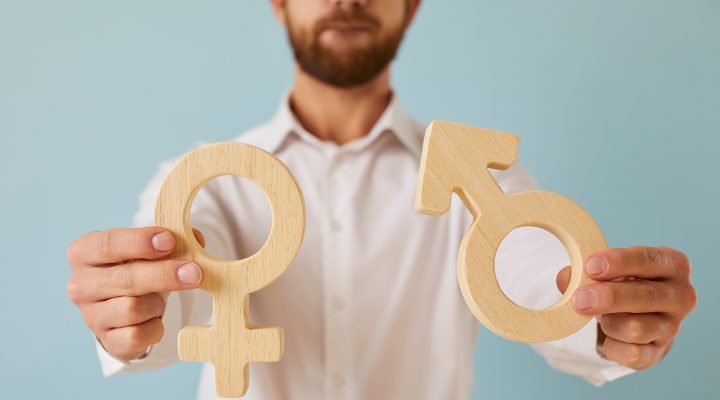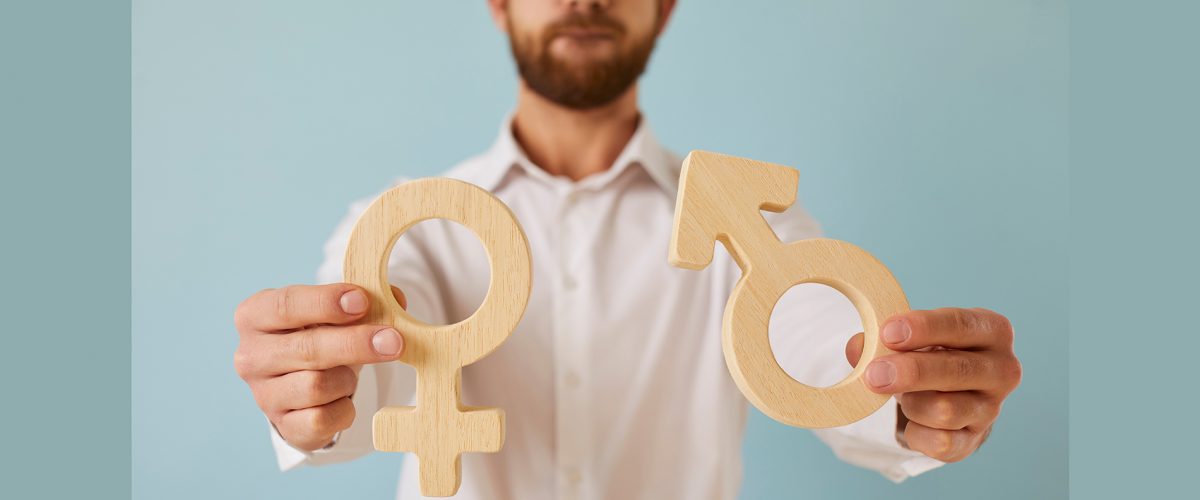The percentage of Americans who believe only two fixed genders exist is steadily increasing, and more than a quarter claim young people are being coerced into being transgender, according to new polling data from Public Religion Research Institute.
Faced with waves of anti-transgender legislation and evangelical talking points, American attitudes have begun to shift, based on PRRI’s survey of U.S. adults in March. The poll asked about perspectives on gender identity, the use of gender-neutral pronouns and whether it is appropriate to teach on these and related topics in public schools.
Today, 65% of American adults say they agree with evangelical teaching that there are only two gender identities — male and female — while 34% say there are “many” possible gender identities.
Those who see a strict binary have grown from 59% in 2021 to 62% in 2022 and now 65% in 2023. Likewise, the share who see a more fluid understanding of gender has shrunk from 40% in 2021 to 34% today.
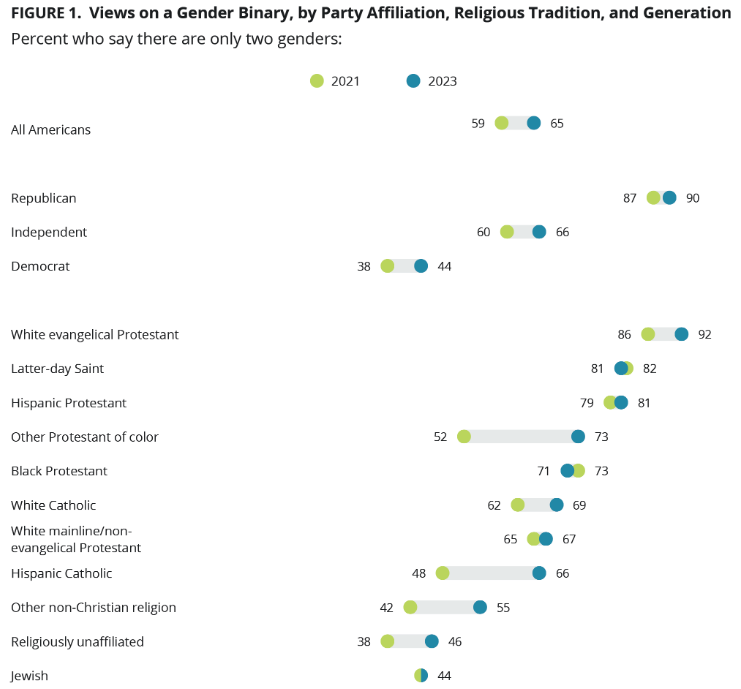
The increased belief in a gender binary shows up across demographic categories, including religious and partisan identity, generation and race, PRRI reported.
“In 2021, 86% of white evangelical Protestants said there are only two genders, compared with 92% in 2023. In both years, around eight in 10 Hispanic Protestants and Latter-day Saints said there are only two genders,” the PRRI report explains. “More than seven in 10 Black Protestants and around two-thirds of white Mainline/non-evangelical Protestants say there are only two genders.”
Even followers of non-Christian religions went from a minority saying there are only two genders in 2021 to a majority having that belief in 2023.
“Jewish Americans have remained consistent, at 44%, on this question. Religiously unaffiliated Americans who believe in only two genders have increased but remain in the minority, going from 38% in 2021 to 46% in 2023,” the report says.
Younger generations of Americans — who often are more liberal in attitudes than their elders — also have grown in believing there are only two fixed genders.
Generation Z went from 43% to 57% on this belief, and Millennials went from 51% to 60%. The generational group most likely to see only binary options on gender is Generation X, those adults born between the Boomers and Millennials. Among Gen-X, 71% now see only binary genders, two points higher than even the senior adults of the Silent Generation.
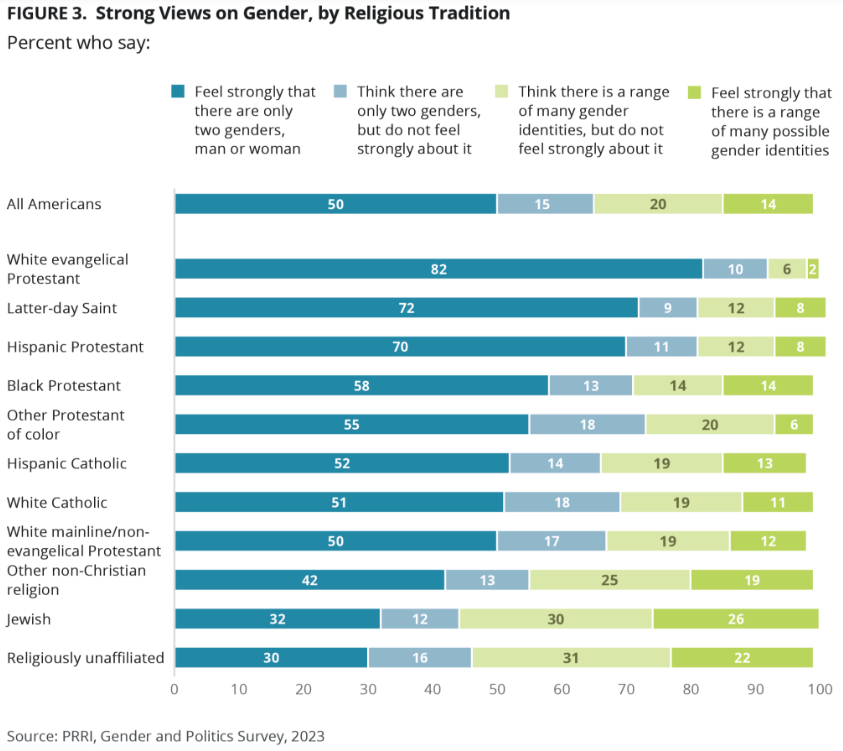
Likewise, rising convictions about gender binary were measured across racial groups from 2021 to 2023, PRRI noted.
And while a majority of Americans with college or postgraduate degrees believe in the gender binary, those majorities are smaller than for Americans with only a high school education or with some college education.
Gay, lesbian and bisexual Americans are less likely than the average American to believe in a strict gender binary. So are Americans who have family members or close friends who identify as transgender. But even in those groups, large numbers believe in the binary.
“Agreement with this idea is around four in 10 for Americans who either identify as transgender or have a family member or close friend who does (40%),” the report says. “Meanwhile, half or slightly more of those who have an acquaintance who is transgender (53%) or who uses gender-neutral pronouns (50%) believe in a gender binary.”
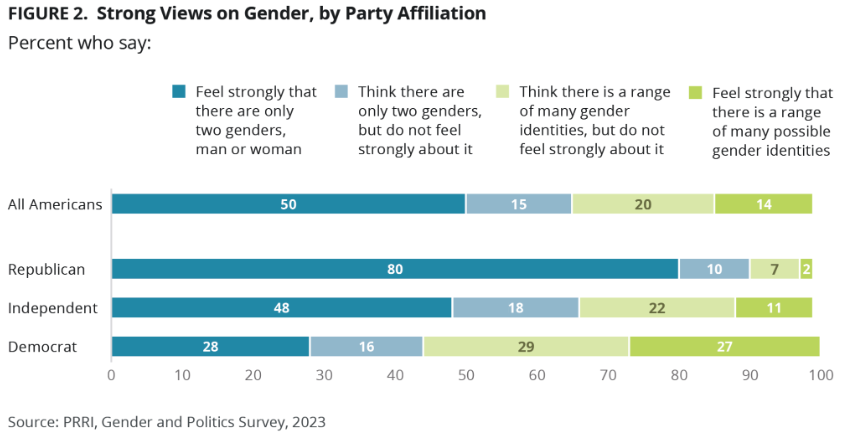
In this year’s polling, PRRI asked respondents to describe the strength of their feelings about gender binary. Researchers found half of Americans expressed their feelings “strongly” that male and female are the only genders.
Such strength of belief is closely associated with religious and political affiliation, education levels and trusted media sources.
“Eight in 10 Republicans (80%) say they feel strongly that there are only two genders, which is significantly higher than the share of independents (48%) and Democrats (28%) who hold the same view,” the report states. “Among white Christian groups, white evangelical Protestants (82%) and Latter-day saints (72%) are much more likely than white Catholics (51%) and white Mainline/non-evangelical Protestants (50%) to strongly feel there are only two genders. Hispanic Protestants (70%) are more likely to express strong belief in a gender binary than are other Christian groups of color (58% of Black Protestants, 55% of other Protestants of color, and 52% of Hispanic Catholics).”
Americans also are divided in their views about friends who use gender-neutral pronouns such as “they” instead of “she” or “he,” PRRI researchers found. “Around one-third of Americans (35%) say they would be somewhat or very comfortable if a friend told them they use gender-neutral pronouns, while 40% would be uncomfortable. One-quarter (23%) say it doesn’t matter either way.”
More than perhaps any other topic except race, opposing teaching about same-sex romantic relationships and gender identity in public schools has been a priority of conservatives in recent years. Entire school board races have hinged on this question.
While about three-fourths of Americans said they would not be troubled to learn a friend identifies as LGBTQ, PRRI found only 8% of Americans said the existence of same-sex relationships should be taught in elementary school, 10% later in elementary school, 28% in middle school and 19% in high school. “Meanwhile, 34% say it is never appropriate to teach about same-sex romantic relationships in public schools,” the report says.

A similar share (34%) believe it is never appropriate to teach in public schools that some people are transgender. On the pro side, 12% say it is appropriate in later elementary school, 27% say it is appropriate in middle school, and 18% say it is appropriate in high school.
A frequent conservative talking point is that public schools are providing harmful information to children about sexual orientation and gender. On that question, Americans are almost evenly divided, with 49% saying yes and 50% saying no.
“White evangelical Protestants (78%) are the most likely to agree with idea that public schools are giving students harmful information, followed by Latter-day Saints (69%), other Protestants of color (64%), Hispanic Protestants (63%), white Catholics (54%), white Mainline/non-evangelical Protestants (53%), Hispanic Catholics (45%), Black Protestants (44%), members of other non-Christian religions (40%), Jewish Americans (32%), and religiously unaffiliated Americans (30%).”
About four in 10 Americans (43%) believe the conservative evangelical assertion that “young people are being peer pressured into being transgender,” PRRI said, while 55% of Americans disagree with that statement.
White evangelical Protestants are by far the most likely to believe young people are being pressured to be transgender (75%) and that people today spend too much time talking about gender and pronouns (85%).
Related articles:
Why being transgender is not a sin | Opinion by Mark Wingfield
Transgender community living in fear, two trans pastors testify
It’s not like there’s trans surgery happening everywhere, doctor explains
The transgender obsession | Opinion by Martin Thielen
The church needs a better story than living in fear | Opinion by Mark Wingfield and Amber Wylde

